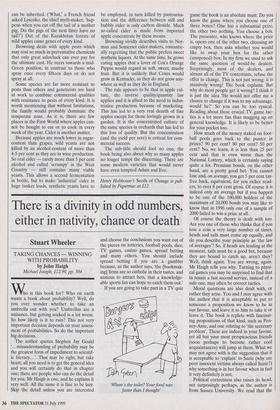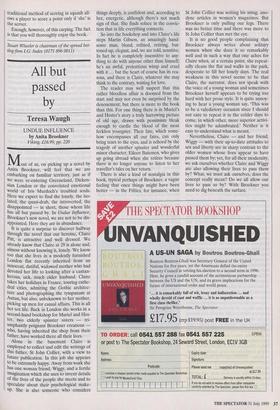There is a divinity in odd numbers, either in nativity,
chance or death
Stuart Wheeler
TAKING CHANCES — WINNING WITH PROBABILITY by John Haigh Michael Joseph, £12.99, pp. 304 ho is this book for? Who on earth wants a book about probability? Well, do you ever wonder whether to take an umbrella out with you? Umbrellas are a nuisance, but getting soaked is a lot worse. So how likely is it to rain? This not very important decision depends on your assess- • ment of probabilities. So do the important big decisions.
The author quotes Stephen Jay Gould '... misunderstanding of probability may be the greatest form of impediment to scientif- ic literacy...'. That may be right, but take heart; all you need is to get the general idea and you will certainly do that in chapter one; there are people who can do the detail for you. Mr Haigh is one, and he explains it very well. All the same it is fine to be lazy. Skip the detail unless you are interested and choose the conclusions you want out of the pieces on lotteries, football pools, dice, TV games, casino games, spread betting and many others. You should include spread betting if you are a gambler because, as the author says, 'the [bookmak- ing] firms are so catholic in their tastes, and anxious to attract bets, that a knowledge- able sports fan can hope to catch them out.'
If you are going to take part in a TV quiz `Where's the toilet? Your food was faster than I thought' game the book is an absolute must. Do you know the game where you choose one of three boxes? One has a substantial prize, the other two nothing. You choose a box. The presenter, who knows where the prize is, opens one of the other two, choosing an empty box, then asks whether you would like to swap your box for the other (unopened) box. In my firm we used to ask the same question of would-be dealers. Surprisingly, most of the dealers, and almost all of the TV contestants, refuse the offer to change. This is not just wrong: it is massively wrong! The book explains. But why do most people get it wrong? I think it is just the idea 'He would not offer me a chance to change if it was to my advantage, would he?' So you can be too cynical. Reading about these crucial TV game tac- tics is a lot more fun than mugging up on general knowledge. It is likely to be better for your pocket too.
How much of the money staked on foot- ball pools goes back to the punter in prizes? 90 per cent? 80 per cent? 50 per cent? No, we learn, it is less than 25 per cent and that is even worse than the National Lottery, which is certainly saying quite a lot. Premium bonds, on the other hand, are a pretty good bet. You cannot lose and, on average, you get 5 per cent tax- free back, equivalent, for you richer read- ers, to over 8 per cent gross. Of course it is indeed only an average but if you happen to be one of the 100,000 holders of the maximum of 20,000 bonds you may like to know that in 1996 only one of a sample of 2000 failed to win a prize at all.
Of course the theory is dealt with too. Are you one of those who thinks that if you toss a coin a very large number of times, heads and tails must come up equally, and do you describe your principle as 'the law of averages'? So, if heads are leading at the moment, tails must be a good bet, because they are bound to catch up, aren't they? Well, think again. You are wrong, again. Mr Haigh tells you why. Turning to physi- cal games you may be surprised to find that in tennis a fast second service, instead of a safe one, may often be correct tactics.
Moral questions are also dealt with, or rather they arise. You and I may agree with the author that it is acceptable to put to someone a proposition we know to be in our favour, and leave it to him to take it or leave it. The book is replete with fascinat- ing propositions of that kind, such as Pen- ney-Ante, and one relating to 'the secretary problem'. These are indeed in your favour, yet all but your most perspicacious friends (soon perhaps to become rather cool acquaintances) will jump at them. What we may not agree with is the suggestion that it is acceptable to 'explain' to Suzie (why are poor innocent victims always called Suzie?) why something is in her favour when in fact it very definitely is not.
Political correctness also raises its head, not surprisingly perhaps, as the author is from Sussex University. We read that the traditional method of scoring in squash all- ows a player to score a point only if 'she' is the server.
Enough, however, of this carping. The fact is that you will thoroughly enjoy the book.
Stuart Wheeler is chairman of the spread bet- ting firm I.G. Index (0171 896 0011)



























































 Previous page
Previous page